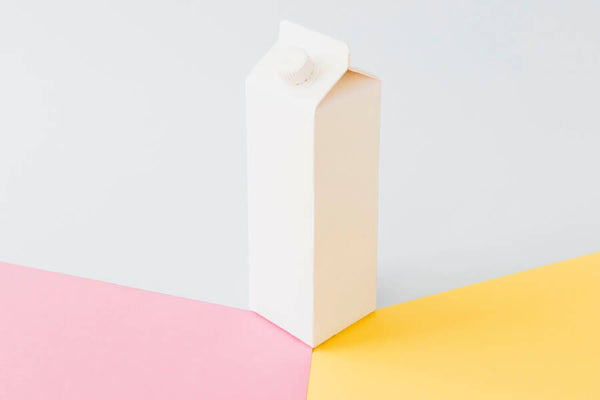Are Oat Milk Cartons Recyclable?
Why should you care?
In the UK alone, 748 cartons are discarded every 10 seconds. That's over 2 billion a year!
The vast majority of these are produced by Swiss conglomerate Tetra Pak.
Whilst Tetra Pak cartons protect oat milk from damage, they’re not all that sustainable.
What are oat milk cartons made from?
If you thought oat milk cartons were made entirely from paper, think again.
They’re actually manufactured from paper, plastic and aluminium.
These materials are then fused together using solvents and high temperatures.

Are oat milk cartons recyclable?
Well, Yes… and No!
Because oat milk cartons are made from paper, plastic and aluminium, recycling them can be a challenge.
It’s a bit like your recycling bin at home... waste needs to be separated before recycling.
The issue with oat milk cartons is that the different materials are glued together very strongly using solvents and high heat.
This makes separation difficult and requires expensive equipment which isn't commonly available.
As a result, the answer to whether they are recyclable is both yes and no.
Whilst it's entirely possible for oat milk cartons to be recycled, it really depends on which council you live in.
Some councils do recycle cartons and some do not. Unfortunately the number of councils which offer Tetra Pak recycling is relatively low.
Do councils actually recycle them?
Another issue is that even if your council claims to recycle Tetra Paks, many don’t actually end up being recycled.
The most recent data shows that 48% of all cartons were collected for recycling (meaning they entered the recycling system).
However, after accounting for wastage caused by dirt and contamination, only half of these make it through the recycling process.
After stacking these figures, only 29.5% of all cartons actually end up being recycled in the UK.
As for the remaining 70.5%, these mostly end up incinerated or in landfills.
The UK has one of the worst carton recycling rates in Europe. We must work together to fix this.
Alternatives to oat milk cartons?
1️⃣ Oat milk powder
Regular oat milk is 90% water, so by using oat milk powder instead and adding the water at home, it uses 10x less packaging.
The packaging of oat milk powder is also single material so it’s also much easier to recycle, compared to multi-layered Tetra Pak.
2️⃣ Refill stores
Another alternative is refill stores, an increasingly popular method of shopping.
At refill stores you fill your own reusable bottles with oat milk eliminating carton waste. Although it's worth checking beforehand as not all refill stores offer oat milk.
The environmental impact of oat milk cartons
The UK discards 60,000 tonnes of cartons each year. This has a huge environmental impact.
🔥 Energy intensive - production of cartons requires high heat and use of solvents.
🛢️ Plastics - cartons require the use of virgin plastics made from polluting crude oil.
🗑️ Landfill - of the 70.5% of cartons which aren’t recycled, many end up in landfills.
☁️ Air pollution - incineration of cartons causes pollution & contributes to global warming.
How to find out if your council recycles oat milk cartons?
To check if oat milk cartons are recyclable in your area, check your local council's website.
A simple Google search e.g. “Are Tetra Pak cartons recyclable [insert council name]” should provide the answer.
How can the problem be solved?
One option is to move to more sustainable alternatives as we mentioned previously.
But beyond this, we need wide-scale action from local and national government.
1️⃣ Council action - more councils must start offering a Tetra Pak recycling scheme.
2️⃣ Education - consumers need to know what is and what isn’t recyclable to increase the collection rate of cartons.
3️⃣ Investment - we need to invest in equipment to allow effective recycling of oat milk cartons.
